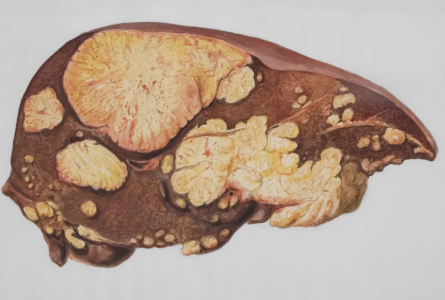One small change could support your liver—and experts say it’s worth it
- Replies 0
When it comes to protecting long-term health, the liver is often overlooked despite its vital role in the body’s everyday function.
Experts warn that liver disease is now the ninth leading cause of death in the US and is becoming more common each year.
By 2040, more than 40% of Americans are expected to develop metabolic dysfunction-associated steatotic liver disease (MASLD), previously called nonalcoholic fatty liver disease. Fortunately, doctors say one habit can help—and the best part is that it’s free and easy to do.
Julia Wattacheril, M.D., M.P.H., director of the Metabolic Dysfunction Steatotic Liver Disease Program at Columbia University, says the solution is simple: “get up!” She explains that sitting less and standing more can make a measurable difference for liver health over time.
“Focusing on small changes that can be sustained over a long period of time is key,” Wattacheril said. “Simply ‘getting up’ is simple to remember and is something most people can do right now.”
Standing more often may seem insignificant, but experts say it sets off a chain reaction of benefits. It helps build and maintain muscle, which is especially important for people with cirrhosis, who often experience frailty due to muscle loss.
It also encourages activity by sending subtle signals that can prompt more movement. As Wattacheril noted, “Just standing gets boring so you’re going to start moving.”

Beyond activity levels, experts point to blood sugar regulation as another major benefit of breaking up long periods of sitting.
Arvind Reddy, M.D., M.P.H., a gastroenterology and hepatology specialist, explained: “Fatty liver disease is believed to reflect insulin resistance. Staying healthy, following a balanced diet and exercising regularly are all important factors in lowering insulin resistance.”
A systematic review even found that standing an extra 1.3 hours per day can reduce fasting blood glucose and body fat, which supports both liver and overall metabolic health.
The liver itself plays a central role in metabolism, processing proteins, fats, and carbohydrates that the body relies on daily.
Also read: 8 everyday habits that could help you avoid a stroke, according to a nurse
Wattacheril says, “The liver is the seat of metabolism, constantly in biological conversation with both muscle and fat.”
Instead of viewing the liver only as a filter for toxins, she encourages people to consider how habits like standing more can actively support its function. This perspective reframes liver health as something that can be strengthened with everyday behavior.
Charlotte Martin, M.S., RDN, emphasizes that liver care should be about balance rather than restriction. “Focusing on both limiting less-healthy habits and adding in positive ones makes liver health feel less restrictive and more like an overall lifestyle upgrade,” she said.
Experts recommend limiting alcohol, maintaining a healthy weight, exercising regularly, being cautious with medications and supplements, and staying up to date with screenings and vaccines.
Also read: Experts reveal how even a single daily drink could jeopardize your health–What you need to know
These strategies, combined with the habit of standing more, offer multiple avenues for protecting the liver. Ultimately, experts agree that the simple act of getting up from your chair more often has powerful effects over time.
It builds muscle, encourages healthier lifestyle choices, regulates blood sugar, and supports the liver’s critical role in metabolism.
While some people may find this easier than others, Wattacheril points out that the habit can always be adapted to individual needs. Even small, intentional changes can deliver big benefits for one of the body’s most important organs.
Read next: These common skin changes might actually point to liver trouble

Will you be trying to stand up more often during your day to protect your liver health? Share your thoughts in the comments and let us know how you plan to add this expert-recommended habit into your routine.
Experts warn that liver disease is now the ninth leading cause of death in the US and is becoming more common each year.
By 2040, more than 40% of Americans are expected to develop metabolic dysfunction-associated steatotic liver disease (MASLD), previously called nonalcoholic fatty liver disease. Fortunately, doctors say one habit can help—and the best part is that it’s free and easy to do.
Julia Wattacheril, M.D., M.P.H., director of the Metabolic Dysfunction Steatotic Liver Disease Program at Columbia University, says the solution is simple: “get up!” She explains that sitting less and standing more can make a measurable difference for liver health over time.
“Focusing on small changes that can be sustained over a long period of time is key,” Wattacheril said. “Simply ‘getting up’ is simple to remember and is something most people can do right now.”
Standing more often may seem insignificant, but experts say it sets off a chain reaction of benefits. It helps build and maintain muscle, which is especially important for people with cirrhosis, who often experience frailty due to muscle loss.
It also encourages activity by sending subtle signals that can prompt more movement. As Wattacheril noted, “Just standing gets boring so you’re going to start moving.”

One small change could support your liver—and experts say it’s worth it. Image source: Europeana / Unsplash
Beyond activity levels, experts point to blood sugar regulation as another major benefit of breaking up long periods of sitting.
Arvind Reddy, M.D., M.P.H., a gastroenterology and hepatology specialist, explained: “Fatty liver disease is believed to reflect insulin resistance. Staying healthy, following a balanced diet and exercising regularly are all important factors in lowering insulin resistance.”
A systematic review even found that standing an extra 1.3 hours per day can reduce fasting blood glucose and body fat, which supports both liver and overall metabolic health.
The liver itself plays a central role in metabolism, processing proteins, fats, and carbohydrates that the body relies on daily.
Also read: 8 everyday habits that could help you avoid a stroke, according to a nurse
Wattacheril says, “The liver is the seat of metabolism, constantly in biological conversation with both muscle and fat.”
Instead of viewing the liver only as a filter for toxins, she encourages people to consider how habits like standing more can actively support its function. This perspective reframes liver health as something that can be strengthened with everyday behavior.
Charlotte Martin, M.S., RDN, emphasizes that liver care should be about balance rather than restriction. “Focusing on both limiting less-healthy habits and adding in positive ones makes liver health feel less restrictive and more like an overall lifestyle upgrade,” she said.
Experts recommend limiting alcohol, maintaining a healthy weight, exercising regularly, being cautious with medications and supplements, and staying up to date with screenings and vaccines.
Also read: Experts reveal how even a single daily drink could jeopardize your health–What you need to know
These strategies, combined with the habit of standing more, offer multiple avenues for protecting the liver. Ultimately, experts agree that the simple act of getting up from your chair more often has powerful effects over time.
It builds muscle, encourages healthier lifestyle choices, regulates blood sugar, and supports the liver’s critical role in metabolism.
While some people may find this easier than others, Wattacheril points out that the habit can always be adapted to individual needs. Even small, intentional changes can deliver big benefits for one of the body’s most important organs.
Read next: These common skin changes might actually point to liver trouble
Key Takeaways
- Liver disease is the ninth leading cause of death in the U.S., and cases are expected to rise significantly by 2040.
- Experts recommend standing more and sitting less, a simple and free habit that benefits liver health by building muscle and regulating metabolism.
- Research shows even small increases in standing time can help lower blood sugar, reduce fat, and encourage more activity.
- Additional strategies include limiting alcohol, maintaining a healthy weight, exercising, using medications carefully, and staying up to date on screenings and vaccines.






